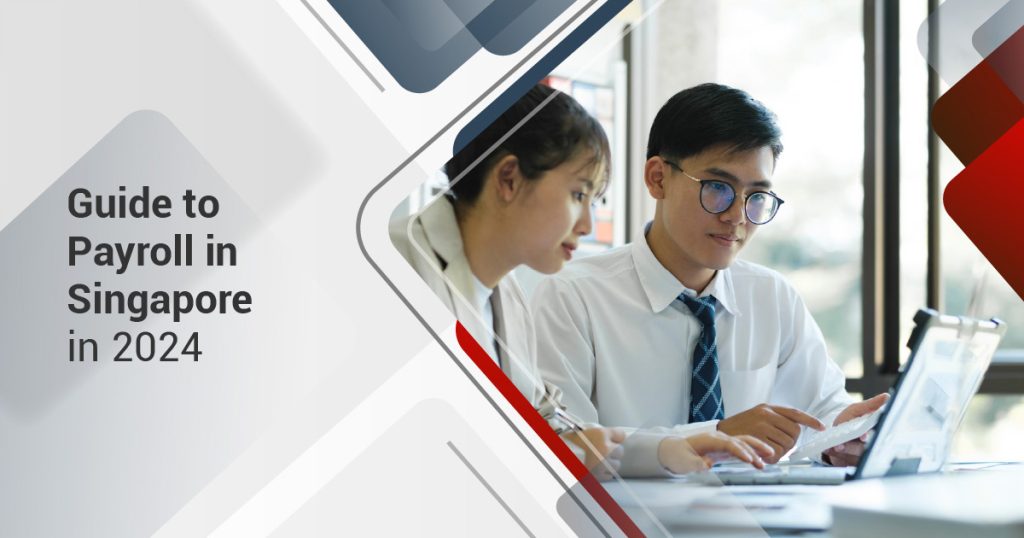Compliance is a tricky hurdle for many companies in Singapore to cross, but it is also a necessary one to avoid being handed various penalties. Payroll compliance, in particular, is important to ensure that businesses operate within the legal framework and maintain good employee relations.
The key aspects of payroll in Singapore typically include social security contributions for employees, worker levies, and income taxation. Companies must be aware of the various regulations and laws governing payroll in Singapore, such as the Employment Act, Central Provident Fund (CPF) Act, and Income Tax Act.
In this blog, we touch on the different aspects of payroll and find out how you can stay compliant throughout its changes for your business success.
Why is Payroll Compliance Important?
If you employ people, payroll is a critical aspect of your business, whether you manage it in-house or outsource it. It represents a significant expense, connects your team to their roles, and is an ongoing business operation.
While few entrepreneurs aim to become payroll experts, having a solid grasp of payroll processes can greatly benefit your business operations. Here is why you should feel empowered to deepen your knowledge of payroll:
Avoid Penalties
Non-compliance with payroll regulations can lead to hefty fines and penalties from regulatory bodies such as the Inland Revenue Authority of Singapore (IRAS) and the CPF Board. Ensuring compliance helps avoid these financial penalties and the associated administrative burdens, therefore safeguarding the business.
Employee Engagement
Although employee engagement is often linked to company culture, benefits, and perks, one of the best and often forgotten ways is to process payroll accurately and timely every payroll period.
Having a good understanding of payroll compliance allows employers to perform this process without problems. Businesses send a message to their employees in this manner, showing that they care about their working experience and understand the importance of salary payment.
Steps Involved in Payroll

Employers in Singapore tend to process payroll by factoring in performance evaluations, performance bonuses, medical leave, statutory claims, and more.
Here are the usual steps that an employer might engage in for payroll processing:
- Step 1: Setting up payroll
- Step 2: Collecting and sorting data obtained from employees
- Step 3: Processing payroll
- Step 4: Creating payroll payment and relevant payslips
- Step 5: Submission of statutory requirements
- Step 6: Making annual report for individual employees’ income tax
Payroll Compliance in Singapore
Payroll compliance in Singapore encompasses two key aspects:
- The Singapore Employment Act
- The Minimum Wage Policy
The Singapore Employment Act
The Singapore Employment Act is the primary payroll law that covers and dictates working conditions and fundamental terms for most employees with some exceptions. It administers and oversees aspects of the relationship between employers and employees in Singapore. Some key principles of the Act are:
- Salaries must be paid to employees at least once a month, within 7 days from the end of the salary period
- Overtime owed to employees must also be paid within 14 days of the salary period
- Bonuses are not required by law to be paid to employees
- An itemised payslip, whether in soft or hard copy, is mandatory to be provided to all employees
The Minimum Wage Policy
Although Singapore does not have a minimum wage policy for local and foreign workers, it adopts a Progressive Wage Model (PWM) that endeavours to support the uplifting of lower-wage workers’ wages by upgrading skills and boosting productivity.
Wages in Singapore are largely determined by market demand and labour supply. Employers are expected to pay their employees based on their skills, experience, and competencies fairly. When hiring foreign employees, employers must also consider the minimum salary requirements needed to obtain the different employment passes in Singapore.
Compulsory Statutory Requirements for Workers
The statutory requirements for employers in Singapore include:
- Social security
- The Central Provident Fund (CPF)
Social Security
Singapore residents benefit from the various statutory benefits for social security aimed at promoting welfare among the people. The social security system relevant to payroll in Singapore has these key aspects:
- Social welfare
- Healthcare
- Retirement
The Central Provident Fund (CPF)
The CPF is an important pillar of Singapore’s social security system that aims to meet the housing, healthcare, and retirement needs of Singaporeans. It is a compulsory social security savings scheme funded by contributions from employers and employees.
Employers must pay CPF contributions to their employees who satisfy all these requirements:
- Are Singapore Citizens or Singapore Permanent Residents (from the 3rd year and onwards)
- Are earning combined wages of more than S$50 a month
CPF Contribution Rates
You must know the prevailing rates to calculate the CPF contributions correctly. The current CPF contribution rates are:
| Employee’s Age (Years) | Contribution Rates From 1st January 2024, for Monthly Wages Over S$750 | ||
|---|---|---|---|
| By Employer (% of Wage) | By Employee (% of Wage) | Total (% of Wage) | |
| 55 and Below | 17 | 20 | 37 |
| Above 55 to 60 | 15 | 16 | 31 |
| Above 60 to 65 | 11.5 | 10.5 | 22 |
| Above 65 to 70 | 9 | 7.5 | 16.5 |
| Above 70 | 7.5 | 5 | 12.5 |
Payments That Attract CPF Contributions
Employers must pay CPF on wages payable to their employees. Under the CPF Act, wages are defined as monetary remuneration, including bonuses owed or granted to an individual in respect of their employment.
Examples of wages include:
- Basic wage
- Overtime pay
- Bonus
- Allowance
- Commission
- Cash incentive
Examples of payments not considered wages are:
- Benefits in kind
- Termination benefit
- Reimbursement
Determining Employees’ CPF Contributions
These are the key steps to take when deciding on your employees’ CPF contributions:
- Choose the CPF contribution rate table depending on the employee’s citizenship status. You need to determine the:
- Citizenship status
- The year of Singapore Permanent Resident (SPR) status
- Determine the rates based on the age group and wage band
- Determine the Total Wages subject to CPF contributions by applying the wage ceilings
- Compute the total CPF contributions and round them off to the nearest dollar
Worker Levies
The mandatory worker levies that employers in Singapore must take note are:
- Foreign Worker Levy (FWL)
- Skills Development Levy (SDL)
Foreign Worker Levy (FWL)
The FWL is a compulsory pricing mechanism that regulates the number of foreigners in Singapore. Employers must pay this monthly levy for their WP holders, which starts from the day the Temporary Work Permit or Work Permit is issued, whichever is earlier. It ends when the permit is cancelled or expires. The levy rate depends on:
- The worker’s qualifications
- The number of S Pass or WP holders hired
Skills Development Levy (SDL)
The SDL is a mandatory levy that employers must pay to employees, both local and foreign, aside from the monthly CPF contributions. The SDL is collected by the CPF Board on behalf of the SkillsFuture Singapore Agency (SSG).
Through the Skills Development Fund, the SDL collected is used to support workforce upgrading programmes and fund training grants for employers sending employees for training under the National Continuing Education Training system.
The SDL payable is set at 0.25% of an employee’s monthly wages. The minimum amount payable is S$2 for employees earning less than S$800 monthly and the maximum is S$11.25 for employees earning over S$4,500 a month.
There are employee type and payment type exemptions to this levy:
- Employee who is a domestic servant, gardener, or chauffeur exclusively and entirely employed by an individual outside of their trade, vocation, business, or profession
- A matriculated or registered student of selected institutions in Singapore, employed for the training approved by the institution in question
- An employee who does not provide any service in Singapore for at least 1 month
- A matriculated or registered student of any overseas tertiary education institution who the institution requires to undergo training in Singapore for a maximum of 6 months
- A registered student (other than a student who has completed his “A” level examinations) of any school registered under the Education Act (Cap. 87) employed during the scheduled school holidays
- Students of Government schools, excluding tertiary institutions, working during their scheduled school holidays
- ‘N’ & ‘O’ level Government school students working during the scheduled school holidays
- ‘A’ level students working during scheduled school holidays before their “A” level examinations
- Bursary
- Education or training reimbursement
- Entertainment expenses
- Finders introduction fees
- Gifts in kind
- Gratuity for employment termination
- Reimbursement for travelling expenses for work
- Housing reimbursement
- Pensions
- Compensation
Singapore Income Tax
Income tax rates depend on an individual’s tax residency status. Singapore follows a progressive income tax system that starts from 0% and ends at 24% for residents. Employers in Singapore are not obliged to withhold taxes from employees every month, which means that the latter is responsible for paying their own taxes.
For non-residents, employment income is taxed at a flat 15% rate or the progressive resident rates, whichever is higher. For taxes on director’s fees, pension fees, and other income, the tax rate for non-residents is 24%.
An individual is considered a Singapore tax resident if they meet these requirements:
- Singapore Citizen or Singapore Permanent Resident residing in Singapore aside from temporary absences
- Foreigner who has stayed or worked in Singapore:
- For at least 183 days in the previous calendar year, or
- Continuously over 3 years, even if the period of stay in Singapore is less than 183 days in the 1st and/or 3rd year, or
- Foreigner who has worked in Singapore for a continuous period spanning 2 calendar years with a total period of stay of at least 183 days
Statutory Requirements for Reporting Employee Earnings
The Singapore Income Tax Act mandates employers to prepare these documents for all employees in Singapore:
- Form IR8A
- Form IR8S
- Appendix 8A
- Appendix 8B
Form IR8A
Form IR8A is a document used in Singapore for tax reporting purposes. It is a mandatory form that employers must complete and submit to the Inland Revenue Authority of Singapore (IRAS) annually, detailing the income earned by their employees in the previous calendar year. Form IR8A must be filed for:
- Full-time resident employees
- Part-time resident employees
- Company director
- Board member obtaining board or committee member fees
- Non-resident employee, including those based overseas, who need to provide services in Singapore for the year
- Pensioner
- Employee who left the company but received income in the previous year, such as in the form of stock options gains
IR8A should not be filed for:
- Foreigners posted overseas who did not provide any employment service in Singapore after clearance was filed
- Foreigners contracted by a Singapore employer to be based overseas and provided employment services entirely outside Singapore for the entire calendar year
- Foreigners who left the company where filing Form IR21 is needed
Form IR8S
Form IR8S only needs to be completed if employers have claimed a refund on excess CPF contributions or have made an excess CPF contribution on an employee’s wages.
Appendix 8A
Employers must fill out this form if an employee received any benefits-in-kind, such as a pilates membership or medical insurance.
Appendix 8B
Employers must fill out this form if an employee received gains or profits from Employee Stock Option (ESOP) Plans or other forms of Employee Share Ownership (ESOW) Plans.
Payroll Regulations in Singapore
As your company continues to grow, its payroll management must also be performed with a high degree of accuracy. Key considerations include some of its core components, such as payroll processing, calculation of payroll, payroll reporting, and maintaining its components, such as deductions, benefits, and allowances.
Here are some essential points to know about payroll in Singapore:
Variable Components
As mentioned, bonuses are not compulsory in Singapore. Neither are the Annual Wage Supplement (AWS) and 13th-month bonus. These form the variable component of an employee’s wages.
A variable payment is an incentive provided to the employee as a reward for contributions provided or to boost productivity. Unless specified in the employment contract, it is not compulsory.
Annual Wage Supplement (AWS)
The AWS, also known as the 13th-month payment, is a single annual payment paid aside from an employee’s total annual wage. AWS payment is made depending on the employer and employee’s collective contract.
Authorised Deductions
Employers in Singapore can impose salary deductions per the Singapore Employment Act for these reasons:
- Employee work absences without valid reasons or notifications
- Loss or damage of money or goods that the employee was accountable for (deduction not exceeding 25% of monthly salary)
- Supply of accommodation accepted by the employee
- Supply of amenities and services authorised by the Commissioner of Labour and accepted by the employee (deduction not exceeding 25% of monthly salary)
- Recovering of loans, advances, overpaid salary, and unearned employment benefits (Loans can be deducted from salary in instalments, with each instalment not exceeding 25% of the salary)
- CPF contributions
- Payments made to any registered cooperative society with written consent
- For other purposes the employee consents in writing
Employees cannot deduct more than 50% of the total salary payable in any single salary period. However, it does not include deductions made for:
- Work absences
- Payments, processed with consent from the employee, to registered cooperative societies for subscriptions, entrance fees, loan instalments, interest and other dues
- Recovery of loans, advances, unearned employment benefits, or overpaid salary
How to Calculate Payroll in Singapore
Here are some key factors to consider when calculating payroll for your employees:
- Basic monthly wage: Does not include any allowances, bonuses, incentives, or reimbursements
- Gross monthly wage: Includes allowances, but does not include reimbursements, productivity incentives, overtime, bonuses, and travel, food, and housing allowances
- Incomplete month and salary: For instances such as when an employee starts work after the first day of the month, is on reservist training, or takes no-pay leave of one or more days in a month
Issuing Itemised Payslips in Singapore
Since 1 April 2016, employers in Singapore must issue itemised payslips to employees covered under the Singapore Employment Act. Payslips must be issued in either soft or hard copy and be given together with employee payment. If they cannot do so, it must be given within three working days of payment.
Items to Include in Payslips
Unless not applicable, a payslip must have these items:
- Employer’s full name
- Employee’s full name
- Payment date, or dates, if the payslips consolidate more than one payment)
- Basic salary
- Beginning and end date of the salary period
- Allowances paid for the salary period
- Any other additional allowances paid for each salary period
InCorp is Here to Assist With Your Payroll Needs

At InCorp, we have robust payroll software and professional tax experts to help your company comply with Singapore’s payroll regulations. We understand the complexity of managing the payroll process and are here to provide a hassle-free experience for your business.
Our team of experts can assist with calculating payroll, issuing payslips, and ensuring compliance with all relevant laws and regulations. Additionally, we offer customised solutions tailored to your specific business needs.
Contact us now to start working on your payroll needs towards complete compliance!
FAQs about Payroll in Singapore
What is the payroll process in Singapore?
- The payroll process in Singapore involves several steps to ensure compliance with local regulations and accurate compensation for employees. For example, it covers the SDL, CPF contributions, and income tax requirements.
What is a payroll example?
- A payroll example can be a part of a company’s payroll processing, which typically includes details like employee names, hours worked, and wages.
How can InCorp help with my payroll needs?
- Our professional payroll team at InCorp is confident that they can assist throughout the entire payroll process, or personalise a solution for your specific business.


